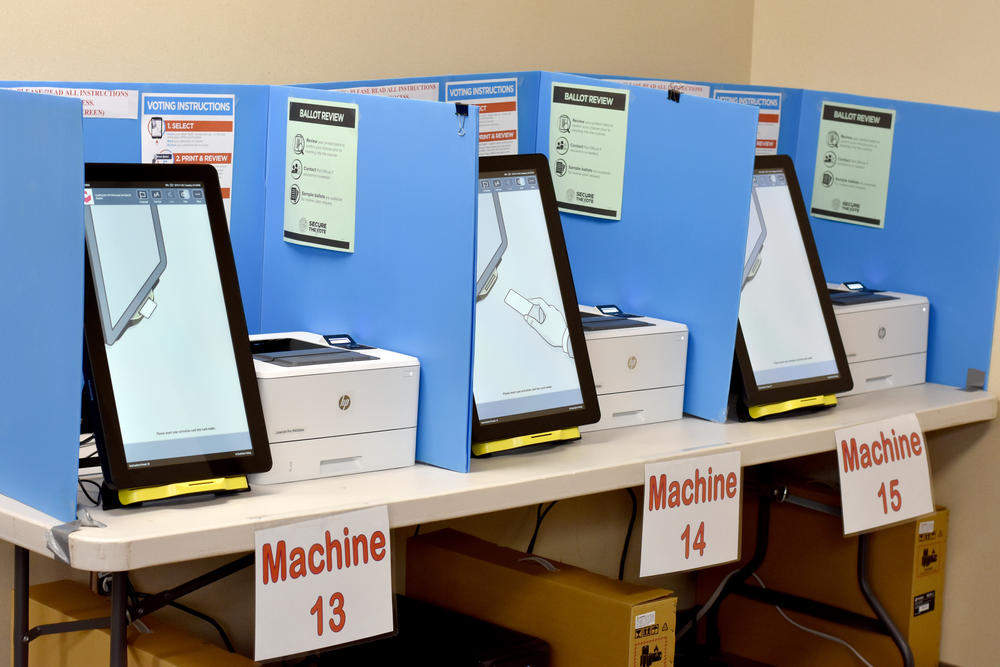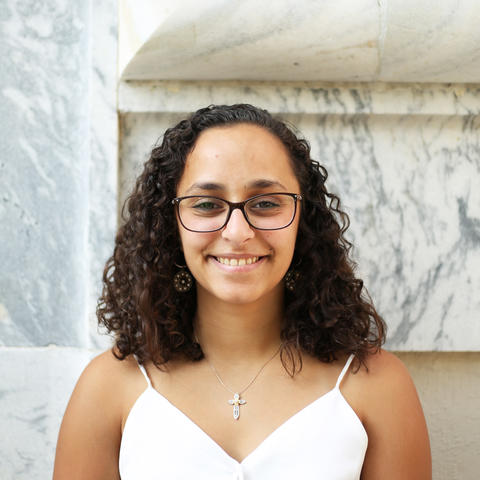Section Branding
Header Content
Georgia Elections Officials Grapple With Potential COVID-19 Illness At Polls
Primary Content
Georgia elections officials face a daunting question as they prepare for early voting in the June 9 primary in the midst of a global pandemic: What do they do if a voter appears ill?
“I’ve asked for guidance from the state as to what we’re supposed to do if a manager notices anyone in line with symptoms,” Fulton County Elections Director Richard Barron said at a recent elections board meeting. “I still haven’t heard back.”
GPB News and the Georgia News Lab asked dozens of county supervisors how they would handle such a situation. None reported receiving any guidance from the state elections officials as of publication, leaving local officials to determine how to balance health and safety concerns due to COVID-19 against the fundamental right to vote.
A spokeswoman for Secretary of State Brad Raffensperger said the office is actively working with counties to develop best practices for polling locations.
“Just like other essential services that have continued to operate during this time, in-person voting will need to incorporate both social distancing and increased cleaning,” Deputy Secretary of State Jordan Fuchs said. “Exact measures will look different depending on the specific polling place but election officials should be prepared to limit the number of people in a polling place at a time.”
RELATED: Georgia Elections Officials Prep for ‘Unprecedented’ Primary As Coronavirus Looms
That mirrors recent guidance from the Centers for Disease Control and Prevention last month that recommends election administrators regularly disinfect polling locations and enforce social distancing.
But both state and CDC guidelines say nothing about what, if any, actions elections officials should take if a voter shows symptoms of the virus at the polls.
The result is a patchwork of interpretations about how to proceed.
“You can’t deny somebody the right to vote”
Many elections officials made clear their staff would try to accommodate voters.
“You can’t discourage somebody or remove somebody from a polling place because that’s taking away their rights,” DeKalb County Elections Director Erica Hamilton said.
Henry County Elections Director Ameika Pitts said she and her staff have developed their own protocols, including possibly creating a separate area for potentially sick voters.
Pitts said she also instructed poll workers to alert a poll manager if he or she notices a voter who appears ill. The poll worker should then speak with the voter and “maybe pull them to the side, and ask them a few questions and keep them out of the loop of the line,” she said.
Poll workers can also offer the voter the opportunity to vote absentee, if it is not Election Day.
In Macon County, Elections Director Patsy Cannon has trained her poll workers to protect themselves and voters from COVID-19 by using hand sanitizer, disinfecting wipes and Lysol spray.
As for voters showing symptoms, “they might get themselves sprayed down if they don’t make it known,” Cannon said. “I’m just being honest with you.”
Sumter County Elections Supervisors Randy Howard said his poll workers may take more extreme actions.
“We’ll monitor the voters,” he said. “If we don’t feel comfortable, we may ask a voter to turn away because we just cannot take the chance.”
Elections experts agree voters shouldn’t be turned away because of possible illness.
“You can't deny somebody the right to vote because they have a temperature,” said Gilda Daniels, director of litigation for the nonprofit civil rights group Advancement Project.
Drive-through polls like the ones used for the primary in Wisconsin were among ideas being considered in Cobb and Rockdale counties.
“We're looking at things that we would never have really looked at before,” Cobb Elections Director Janine Eveler said.
https://www.youtube.com/watch?v=ZgihFoMxKp4
Keeping poll workers healthy
Though nearly a million Georgians are planning to vote with an absentee ballot, and the state has taken steps to encourage Georgians to vote by mail, not everyone is able to do so.
Some voters require in-person accommodations due to vision impairment, hearing difficulties or other disabilities. State law also requires three weeks of early voting plus Election Day.
MORE: Georgia Elections Officials Navigate Sea Of Absentee Applications While Polling Places Back Out
Some supervisors, like Pitts in Henry County, have poll workers and other staff who are hesitant to risk exposure to COVID-19 while working the election.
Most poll workers are 60 or older, a population the CDC has identified as being vulnerable and more at-risk for complications from COVID-19.
“I expect a lot of poll workers at some point to say, ‘I gotta put my family first,’” Pitts said.
In Fayette County, a dwindling number of poll workers resulted in the shutdown of at least one polling location.
“We lost the Tyrone location because of COVID, and we have not been able to find the personnel for it,” Fayette Elections Director Floyd Jones said.
What’s more, elections officials are unsure how they will comply with a new state law requiring one voting machine for every 250 active registered voters, a setup that puts voters in close proximity at many polling places statewide.
Jones said he must make a decision on whether to follow state law or the CDC’s social distancing guidelines for polling places.
“At some point, if I'm a poll worker, I'm going to be closer than six feet [apart from voters], because you have to sign documents [and] you have to sign the poll pads.”
Social distancing requirements coupled with fewer voting machines could result in longer wait times for voters, officials in Henry and Fulton counties said.
“You have more space in between each person in line. You'll have less people in the voting area,” Pitts said. “It will cause a long line if there is a very high turnout, which most likely will be.”
The full implications of the virus hit close to home for the staff of Fulton County’s elections office, where an employee recently died of COVID-19 and another was hospitalized.
“This is pretty real to us,” Barron said. “I feel a responsibility to the safety of these individuals.”
Eveler, in Cobb County, said she realizes the gravity of the decisions she will have to make.
“It is a big weight,” she said. “I mean, you're responsible for the safety of all the people that work under you.”
Seeking help from the state
As early voting draws closer, and the number of COVID-19 cases rise, counties are putting the final touches on plans to conduct elections with new precautions.
The secretary of state's office said in a statement that it was working with county elections officials to procure personal protective equipment for poll workers and cleaning supplies for voting equipment.
“The state has asked us to try to locate whatever supplies we can get with 90% reimbursement as a grant for anything we find,” Jones, in Fayette County, said. “It may be a good chance that the supplies won't be here in time.”
Robin Webb, the elections director from Hart County, said she thinks the state has been supportive but the right answers take time. “It takes patience on our end to wait to hear [the state’s] solutions for our problems,” Webb said. "It's just a matter of us all hanging in there.”
Meanwhile, elections officials continue preparing for the many unprecedented situations they are likely to face.
Asked how poll workers in Jones County would deal with a voter who showed signs of illness, Election Supervisor Marion Hatton said, “I have not even thought about that until you just said it ... now you gave me something else to worry about, thank you.”
Ada Wood, Mary Margaret Stewart and Nicole Sadek are reporters with the Georgia News Lab. The News Lab is an investigative reporting partnership between Georgia universities, Georgia Public Broadcasting, The Atlanta Journal-Constitution and WSB-TV. News Lab reporters Imani Dennis, Eric Fan and Madilyn Harrell also contributed reporting to this story. The story is part of a series being produced by GPB and the News Lab. Reporting for this story was funded in part by the Democracy Fund.



